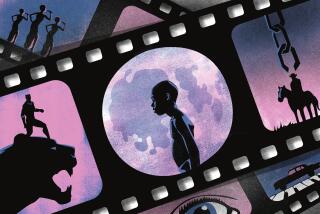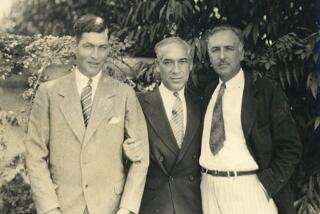Classic Hollywood: Pre-code films out from Warner Archive
Between the mid-1930s and the mid-1960s, American movies could be fairly described as squeaky clean.
During that time, married couples depicted in films slept in twin beds, and if there was a romantic scene on a bed, one actor had to have a foot firmly on the ground while kissing. Violence, even in war films and films noir, was more implied than illustrated, and language was definitely G-rated. Just to get Rhett Butler to say his famous “Frankly, my dear, I don’t give a damn” in 1939’s “Gone With the Wind” almost took an act of Congress.
But the era before July 1, 1934, when the Motion Picture Production Code, a.k.a. the Hays Office, became strictly enforced was practically “anything goes” in the movies. These “pre-code” films were filled with violence, sexual promiscuity, drug use, references to homosexuality — albeit with very stereotypical portrayals — and all kinds of innuendo. And couples, married or not, shared a single bed.
Though a number of these films revolved around the gangster world, including 1930’s “Little Caesar,” 1931’s “The Public Enemy” and 1932’s “Scarface,” these pre-code films were generally dominated by strong female actresses such as Barbara Stanywick, Jean Harlow, Greta Garbo and Clara Bow.
Women were much more sexually aggressive in pre-code films, morals were loose. Their dialogue was suggestive. And their often skimpy outfits left little to the imagination. Some actresses who starred in pre-code films flourished after the code crackdown in 1934. But others, like Mae West, whose image was so sexually charged, lost audiences as a more sanitized version of herself.
With the erosion of movie audiences because of the enormous popularity of TV and an influx of far more sophisticated international films in the 1950s, the Production Code began to lose its grip on Hollywood. In late 1968 the MPAA rating system went into effect.
Warner Archive recently released several of these pre-code flicks with such rising stars of the time as Loretta Young, Joan Blondell and Myrna Loy as well as actresses who are faded footnotes of the era — Dorothy Mackaill and Alice White. Here’s a look at the pre-code films of two of the stars — Young and Blondell — whose early work might shock those who became fans later.
Loretta Young (1913-2000)
The Oscar winner is featured in five of the films in the Warner Archive releases. The best of the bunch is the 1930 comedy “Loose Ankles” (though there is no explanation in the film as to what a “loose ankle” is supposed to mean).
Directed by Ted Wilde, this comedy stars the 17-year-old Young as an heiress who will inherit millions if her stuffy aunts and uncle approve of her husband. She decides to get back at them by trying to cause a scandal. She takes an ad out in the paper to find a man who will put her in an uncompromising position. Douglas Fairbanks Jr.’s character, who at one point is running around in his underwear and a woman’s robe, answers the ad. He also happens to be rooming with young gigolos. Famed silent film comedian Louise Fazenda is on hand as one of Young’s aunts who gets drunk at a speak-easy.
The second film on the disc is 1931’s “Naughty Flirt” starring White, whose hammy comedic techniques have not stood the test of time. The film is noteworthy for Loy’s performance as a vamp.
Another Young film from 1930, “Road to Paradise,” cast her as twins — one who has been raised by crooks and the other living in the lap of luxury. The crooked guardians have her infiltrate her sister’s house to steal jewels. That same year, Young also starred in “The Truth About Youth,” in which she plays a young woman, the daughter of a wealthy bachelor’s housekeeper, who had been promised in marriage to the man’s ward (David Manners). However, he has set his sights on a money-hungry singer-dancer (Loy, in one of her early pivotal roles).
In the 1931 melodrama of redemption “The Right of Way,” Young plays a French-Canadian woman living in the wilderness who falls in love with an amnesiac (Conrad Nagel) who had been an insipid womanizing attorney before he was beaten up in a bar. And though morality is played fast and loose in most pre-code films, in 1933’s “Week-End Marriage,” Young is punished by family and friends for taking a job when her whiny husband (Norman Foster) loses his.
Joan Blondell (1906-79)
This blond, wisecracking actress fit perfectly into the mold of a Warner Bros. pre-code heroine. She made her Broadway debut with newcomer James Cagney in 1930’s “Penny Arcade” and came to Hollywood the same year to appear with Cagney in the film version, “Sinner’s Holiday.” In 1930, she also made an impression in a supporting role as Mackaill’s peppy younger sister in the melodrama “Office Wife.” (Mackaill also stars in the 1931 drama “Party Husband,” which is included on the “Office Wife” disc.)
Blondell has starring roles in the 1934 comedy “I’ve Got Your Number” and 1933’s “Havana Widows,” which are featured on one disc.
“I’ve Got Your Number” was released just before the code crackdown. Blondell plays a telephone operator who accidentally allows crooks to steal money when she misdirects a phone call. A leering Pat O’Brien plays a telephone repairman who seems to be catnip to almost every woman he meets, including some high-priced call girls who live in a swank apartment and want him to provide them with a longer chord for their bedroom phone.
“Havana Widows” was one of the four films in which Blondell teamed with actress Glenda Farrell as wisecracking working-class girls. This 1933 slapstick farce with music is about two gold digger friends who go to Havana to seduce older men into compromising positions for their money.
More to Read
The biggest entertainment stories
Get our big stories about Hollywood, film, television, music, arts, culture and more right in your inbox as soon as they publish.
You may occasionally receive promotional content from the Los Angeles Times.







